78 Search Results for object symbols
August 1, 2022
by Carole Zangari -
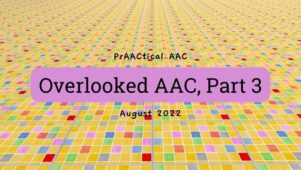
There are a lot of aspects of AAC service provision, and usually not enough time to address all the things that need to be done. In today’s post, we continue the conversation of things that often take a back seat in AAC services, hoping that it inspires a few of you to action. This time our focus is transitions. Going to nursery or preschool for the first time. Moving from one teacher or therapist to another. Exiting the school system. Transitions always seem to bring a little extra anxiety and a few additional bumps in the road. Here are some things that make some of those changes go a little more smoothly. Entering a New Environment Prepare the individual: Explain what will be happening. Use visual supports, like a picture schedule or calendar, to show when the transition will occur. Keep it in a visible spot and review it periodically... [Read More...]
February 7, 2022
by Carole Zangari -
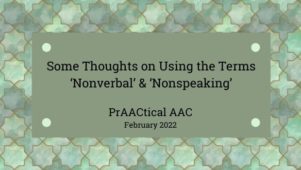
Terminology has always been a challenge in the field of AAC, at least in English. Why does it take 14 syllables (“aug-men-ta-tive and al-ter-na-tive com-mu-ni-ca-tion”) to refer to a field that emerged to support individuals for whom speech is intensely problematic? I remember spirited discussions on what to call this work back when I was at Purdue University on an AAC doctoral fellowship, just after the birth of the International AAC Society (ISAAC) in 1983. When the US Society for AAC was started in 1991, those debates continued. The terms ‘nonvocal,’ ‘nonoral,’ ‘nonspeech,’ and ‘nonspeaking’ were used by many in the early days. Those terms eventually dwindled in popularity, primarily because so many children and adults who needed the support of AAC were able to talk and/or make sounds. Often, their speech was difficult to understand, slow and exhausting to produce, and limited in terms of conventional structures for expressing... [Read More...]
November 15, 2021
by Carole Zangari -
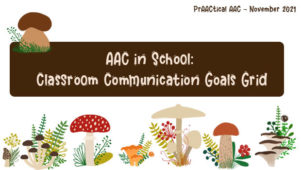
AAC SLP Vicki Clarke is known to long-time readers for her excellent series, AAC Assessment Corner, and her collaboration with Holly Schneider in creating the Dynamic AAC Goals Grid (DAGG-2). Today, we welcome her back to tell us about the revised version of her goal-setting guide designed especially for school settings. Join us in learning about the Classroom Communication Goals Grid and download a free copy. Classroom Communication Goals Grid- Revised https://www.teacherspayteachers.com/Product/AAC-Classroom-Communication-Project-2021-Intro-and-Tools-4219461 It’s been over 5 years since I developed the Classroom Communication Goals Grid. During that time it’s been in use in many of our districts helping teachers and therapists assess the communication skills of their students, select goals relevant to the academic environment, and show progress at annual IEP time. The Grid needed some revision, a little more review of current research, a little reorganization of goals, and a facelift! This article is to introduce you to the... [Read More...]
October 18, 2021
by Carole Zangari -
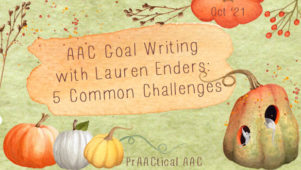
Goal writing is a challenging topic even for veteran AAC service providers. Today, we continue the AAC Goal Writing series guest authored by AAC and AT expert, Lauren Enders, who works as an AAC/AT Consultant for Bucks County Intermediate Unit in eastern Pennsylvania. A frequent presenter at local, regional, and national conferences, Lauren uses her knowledge to support families and professionals alike. In this post, she provides suggestions for addressing some of the most common challenges in writing AAC goals and objectives. ::::::::::::::::::::::::::::::::::::::::::::::::::::::::::::::::::::::::::::::::::::::::::::::: FIVE COMMON AAC GOAL WRITING CHALLENGES In the inaugural post of this series, you learned that if you feel intimidated by the process of writing goals and objectives for AAC learners, you are not alone. AAC goal writing can be intimidating. The good news is that with guidance, resources, tools, and practice, AAC goal writing gets easier. In this post, we’ll examine common AAC goal writing... [Read More...]
September 13, 2021
by Carole Zangari -
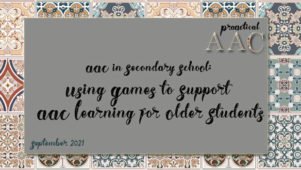
Looking for activities that will help in teaching older students to be effective communicators with AAC? AAC SLP Ashley Larisey is back with us to share another post in the AAC in Secondary School series. Ashley is an SLP at Community High School District 218 in Oak Lawn, Illinois. She is also an Adjunct Clinical Supervisor and Instructor at Saint Xavier University. In today’s post, she shares ideas and resources for using games to support AAC learning by high school students. :::::::::::::::::::::::::::::::::::::::::::::::::::::::::::::::::::::::::::::::::::::::::::::::::::::::::::::::::::::: Using Games to Support AAC Learning for Older Students It’s no secret that using games is a great way to increase student engagement. Games provide opportunities for language and literacy learning, personal enjoyment, social connectedness, and laughter. Games can be used to target communicative functions like requesting (I want the green piece), commenting (No way!, Me too, Get out of here!), rejecting/refusing (Not that one, Don’t like, Don’t... [Read More...]
April 19, 2021
by Carole Zangari -
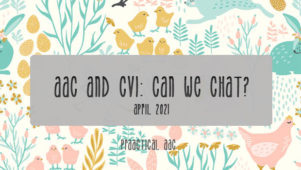
Do you serve students with cortical visual impairment (CVI)? Teacher of the visually impaired Dr. Sandra Newcomb and AAC SLP Debbie Perry regularly combine their expertise and collaborate to support children with CVI who are learning to use AAC. In today’s post, they take us beyond the basics to share their thoughts on the complex issues that we should consider in serving this population. Follow along as they challenge some assumptions and provide helpful suggestions. :::::::::::::::::::::::::::::::::::::::::::::::::::::::::::::::::::::::::::::::::::::::: AAC and CVI: Can We Chat? Cortical Visual Impairment (CVI) is vision loss due to damage or malformation in the brain that interferes with the child’s ability to understand vision information coming from the eyes. It is the number one cause of vision impairment for young children in developed countries. It has been found that 10.5% of children with developmental disabilities have CVI [1]. This means if you are a pediatric SLP you will... [Read More...]
March 8, 2021
by Carole Zangari -
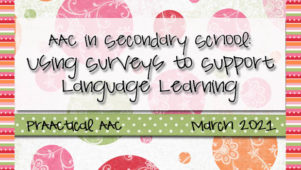
It’s a great day to explore ways to support AAC use, and today AAC SLP Ashley Larisey joins us with some activity suggestions and lots of implementation tips. Ashley is an SLP at Community High School District 218 in Oak Lawn, Illinois. She is also an Adjunct Clinical Supervisor and Instructor at Saint Xavier University. This post, part of the AAC in Secondary School series, focuses on the use of language experience surveys with students who are learning to use AAC. :::::::::::::::::::::::::::::::::::::::::::::::::::::::::::::::::::::::::::::::::::::: Surveys Surveys can be used within almost any classroom activity to provide students with opportunities to communicate with both familiar and non-familiar listeners. Questions that are used for the survey can be used to gather more information about a topic that guides decision-making. Surveys can be embedded into academic, social, vocational, and community-based instruction. Take a look at some examples of how to use surveys in your classroom... [Read More...]
October 3, 2019
by Carole Zangari -
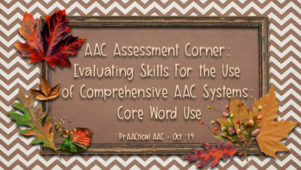
We are so very pleased to welcome Vicki Clarke back to these pages for another installment in our AAC Assessment Corner. Vicki is the CEO of Dynamic Therapy Associates and Director of DTA Schools, is back with another wonderful edition of AAC Assessment Corner. In addition to their clinic, Vicki and her team support school districts in AAC evaluation, equipment procurement, and implementation for individual students in the academic environment. DTA Schools also supports district-wide AAC implementation through the Classroom Communication Goals Project, training, and supporting all team members in classroom AAC implementation. :::::::::::::::::::::::::::::::::::::::::::::::::::::::::::::::::::::::::::::::::::::::::::::::::::::::::::::: Evaluating Skills For the Use of Comprehensive AAC Systems: CORE WORD USE ACTION/OBJECT REQUESTS-RECURRENCE, CESSATION, ACTION More, Stop, Go and Want Once we have assessed our student’s ability to understand and use photos and symbols for concrete, motivating items, it’s time to take a look at their ability to understand and use more abstract, generalizable core vocabulary. ... [Read More...]
September 2, 2019
by Carole Zangari -
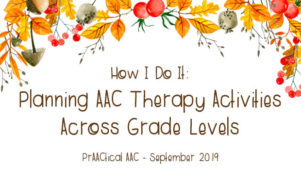
AAC SLP Amanda Samperi is back with another post in her series about the prAACtical aspects of AAC therapy. In this post, Amanda shares her views and experiences on helping students with AAC needs build their language skills. You can see her previous posts in this series here. Putting the FUN Back in FUNctional Working with Multiple Symbol Sets ::::::::::::::::::::::::::::::::::::::::::::::: How I Do It: AAC Therapy is Language Therapy I’ve traveled between several states and many different schools over the past few years. Because of this, I’ve had the privilege of working with some amazing SLPs! They’re talented, strong, creative, and love their kiddos more than anything. And just like any other team, each of us has different strengths and weaknesses. When I’m joining a Speech team, there’s usually at least one other SLP with specialties that are outside of my wheelhouse. However, she isn’t very comfortable with AAC. It... [Read More...]
August 19, 2019
by Carole Zangari -
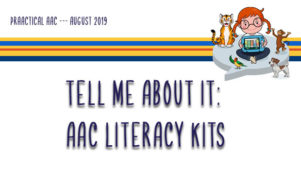
Combining AAC learning with literacy activities is one of our favorite ways to support young learners. We start off the week with a taste of how AT specialists in one school district are helping preschool special education teachers build a foundation of core vocabulary in their students. Maggie Judson and Jeanna Antrim are speech-language pathologists who work in the Assistive Technology Department for the Belleville Area Special Services Cooperative (BASSC) in southern Illinois. They are AT/AAC facilitators and provide evaluations, direct therapy, consultations, and trainings with school teams. This is the first of a series of posts in which Maggie and Jeanna discuss ways that books from the TELL ME program can be used to support AAC learning. Enjoy! :::::::::::::::::::::::::::::::::::::::::::::::::::::::::::::::::::::::::::::::::::::::::::::::::::::::::::::::::::::::::::::::::::::::: As AAC facilitators for a special education cooperative, we are always on the lookout for effective ways to provide our students access to instructional materials and activities that not... [Read More...]









